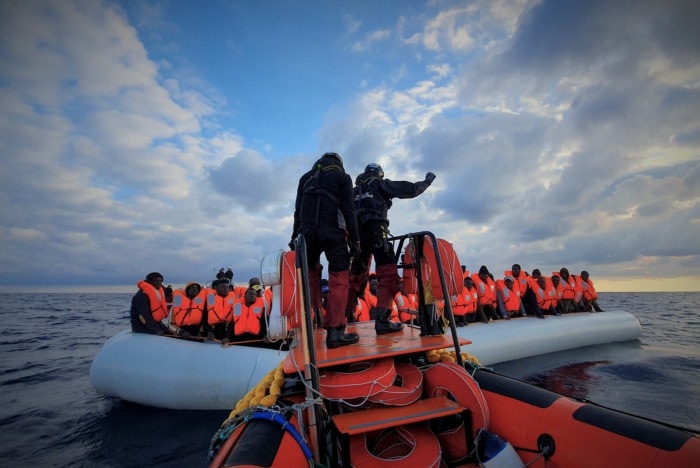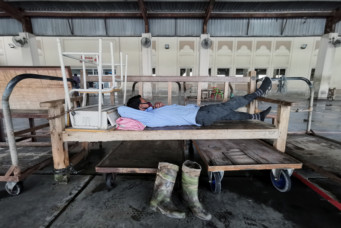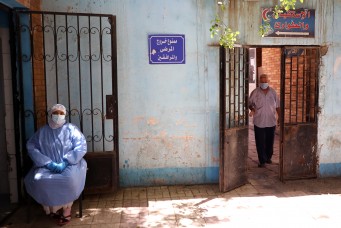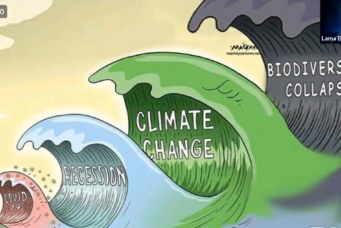COVID-19 Heightens Stakes for Migrants in the Mediterranean
COVID-19 has exacerbated anti-migration trends in the Mediterranean region, leaving migrants and refugees in increasingly vulnerable positions.

Migrants wearing lifejackets on a rubber dinghy are pictured during a rescue operation by the MSF-SOS Mediterranee run Ocean Viking rescue ship, off the coast of Libya in the Mediterranean Sea, February 18, 2020. Hannah Wallace Bowman/Reuters
When one thinks of a symbol of the Mediterranean, one may think of olives, or, perhaps, Dalida. Indeed, the Franco-Italian singer born and raised in Egypt made waves on both shores, singing in several languages including French, Italian, Spanish, and Arabic. However, the experiences of those who cross the pond have not always been as favorable. A bloody history between France and Algeria led to the alienation of certain groups, such as the Pied-Noirs (French living in Algeria before independence) and the Harkis (Muslims fighting for the French army) in both countries – while similar sentiments accompany today’s migrants from the Maghreb. These struggles are a representation of a larger trend of North African migration to Europe, where the socioeconomic dynamics of the former colonizer and colonized still play a defining role.
For various reasons, one of which is colonization, there is more wealth in Europe. Naturally, there are significant migratory movements from south to north, but such movements face great difficulties during the journey and after the arrival. Furthermore, not all migration is the same. While there are difficulties in any sort of migration, the experiences of migration for economic purposes may be different from those of refugees fleeing war. As such, migration in the Euro-Mediterranean space is a multi-layered issue whose dynamics vary by country of origin, journey, and country of destination.
With the shock of Covid-19 dominating the news cycle and shaking the very foundations of our healthcare and economic systems, it’s easy to forget that fighting is still ongoing in Libya and Syria. More so, it is easy to forget that there are people who still wish to cross the Mediterranean and migrate. Covid-19 has left every state looking inwards to the point where the only individuals moving outwards, those who are fleeing conflict or seeking better opportunities notwithstanding the pandemic, are met with ‘unsafe’ harbors and closed borders. Even many of those who have already migrated were left stranded, unable to return home, and with little information.
To look into the question of migration across the Mediterranean, the Center for Migration and Refugee Studies (CMRS) at the American University in Cairo hosted a webinar on July 15th entitled “Impacts of Covid-19 on Migration in the Euro-Mediterranean Space” which brought together experts in the field of migration to debate the issue. The webinar, chaired by Ibrahim Awad, director of CMRS, brought to the fore questions of the short term impact of the pandemic on migratory movements, policy and conduct of transit and destination countries, and the struggles of already-present migrants who wish to return, as well as the long term impacts that Covid-19 may bring on migration in the Euro-Mediterranean space.
What’s happened in the last few months?
According to Maurice Stierl, a Leverhulme Early Career Fellow at the University of Warwick who has done extensive research on migration and border governance, Covid-19 represents a sort of accelerated continuity rather than a “sudden rupture.” In other words, the pandemic did not reverse the ways in which European governments deal with their borders, but simply accelerated the already present patterns of “securitization of borders and criminalization of migration.” Stierl brings to our attention the fact that since 2015, Europe has invested in its “external dimension,” creating policy instruments and deterrence operations that further tightens its controls on its borders, as well as ‘supporting’ countries of transit and origin in order to ensure that migrants can disembark safely and be sent back. Indeed, 6000 people have been intercepted and returned to Libya just this year.
Stierl claims that Europe has used the pandemic as a way to systematize human rights and maritime law violations, consistently denying and obstructing various NGOs involved in the migration process with claims that they are helping smugglers, thus eliminating documentation of human rights violations. Stierl emphasizes that this latter aspect was accelerated during Covid-19, he singles out Malta in particular as having used the pandemic in this way, as it declared its ports “unsafe” in early April due to health reasons and left 150 migrants stranded at sea. The migrants were only taken in several weeks later in early June, with their numbers at sea swelling to 425 stranded before reaching land.
Those who were already residents of their destination countries also faced uncertainty during the lockdown phase of the pandemic. According to Aurelia Segatti, a Labor Migration Expert at the International Labor Organization, the repatriation experiences varied from country to country, with Tunisia repatriating its citizens early on in the pandemic but Morocco waiting until June to do so. To add to the uncertainty from a policy-making perspective, Segatti points out the fact that there is no regional-level, consolidated data on citizens of North African countries affected by the crisis, emphasizing the lack of unified data collection and formalization mechanisms in the region.
From an Egyptian perspective, there are still challenges. However, Ayman Zohry, founding president of the Egyptian Society for Migration Studies, states that the difficulties faced by Egyptians during Covid-19 are greater for those working in the Middle East, as most Egyptians in Europe hold European citizenship.
In the Gulf, which is the main source of remittances to Egypt, the story is different. 6500 Egyptians in Kuwait were facing a precarious situation with no legal residency, having been put in immigration shelters for weeks before being repatriated. Many more will face an equally precarious future, with decreased oil prices and, according to Zohry, an expected increase in the nationalization of labor in the Gulf.
Scenarios for the long-term
We have not yet reached the stage where we can see exactly how the post-Covid-19 world will function. However, there are some predictions being made based on previous patterns and evidence, and as such there are some possible scenarios related to migration in the long term. A UNODC report related to the impacts of Covid-19 on smuggling and migration predicts the following:
“The widespread nature of this current economic crisis, together with increased control at borders due to COVID-19, are likely to reduce irregular migratory movement and related migrant smuggling in the short term. But in the medium to long term, an unequal economic recovery will increase labour migration, and without increased possibilities for regular migration this is likely to increase smuggling of migrants towards the countries that have a faster recovery.”
Unfortunately, it seems that the post-Covid-19 world will be even harsher towards migrants, feeling the effects of an asymmetric economic downturn and recovery and, going back to Maurice Stierl’s insights, an increased securitization of borders. Stierl is vocal not only of European countries’ own securitization, but also of the continued “hegemonic dimension” of European border reinforcement within Africa through pressure in international alliances like the International Organization of Migration (IOM).
In the future, Europe may find itself dealing with an influx of Egyptian migration as well. According to Ayman Zohry, because of the move to nationalize jobs in the Gulf coupled with the desire of migrants to go somewhere where they can naturalize, Egyptian labor migrants who would have worked in the Gulf are likely to turn towards Europe as an alternative.
The dissonance between the long term view of the countries in the Euro-Mediterranean space and the parallel continued and likely increasing migration is cause for alarm. Aurelia Segatti, while cautious, sees a window of opportunity and provides a balanced view of the future. There is still hope for labor and for a better future for migrants, but only if there is a clear vision and swift action taken towards achieving this goal. Segatti sees the situation over the long term as a “double edged sword.” On one hand, the crisis and its migration-related issues (lack of good databases, weak emergency mechanisms) can serve as a wake up call for North African countries to build more robust information systems and to enhance safety nets for their workers abroad. She determines that the window to renegotiate bilateral labor agreements is in the upcoming few months. Certainly, it is the cusp between international systems separated by the pandemic.
This all depends on the swiftness and agility of North African governments. If the narrow window is missed, Segatti warns that “the situation could exacerbate the precarity of migrant workers.” She reminds us that it is our responsibility as academics and policy-makers to push towards the right direction, “otherwise it’s very likely that we’ll see dire consequences for labor.”
Omar Auf is deputy senior editor at the Cairo Review of Global Affairs. He has previously worked and published in independent media organization Mada Masr and as an assistant editor at the Cairo Review.
Auf holds a Master of Global Affairs degree with a regional and international security concentration from the American University in Cairo, and a Bachelor of Arts in economics from Sciences Po Paris.
Read More



